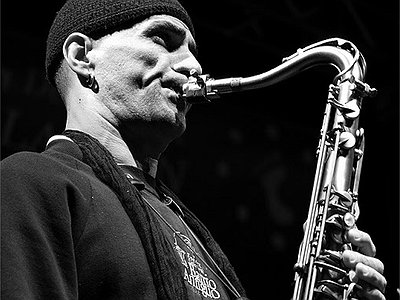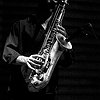Part 2
With more and more musicians creating than ever and more, what does this mean for you as an artist in terms of originality? What are some of the areas where you currently see the greatest potential for originality and who are some of the artists and communities that you find inspiring in this regard?
I like the fact that there are more musicians interested in free music. Some will be very original, some not so much; some will perform many concerts, some will not; some will develop greatly in the long term, others will just shine for a short time. In truth, we are all original beings. Some of us more than others, but we are all unique and unrepeatable. I come from jazz and free jazz, and my inspirations remain the same as when I was 14, and my teachers are still the same: Sonny Rollins, Braxton, Coltrane, Steve Lacy, Evan Parker, Ornette, Charlie Parker, Pharoah Sanders, Sam Rivers, Wayne Shorter, Monk, Miles, Jimmy Lions, etc. I have also found an open field in the language of electroacoustic music. As human beings we have the ability to create and keep creating over and over, creating and re-creating.
What constitutes a good live performance in your opinion and what’s your approach to performing on stage? How do an improvisation and the recording of this improvisation compare?
What I look for every time I play live or in a recording is to be able to express myself as sincerely as possible. When I manage to connect with myself, the audience perceives it and appreciates it. A recording, just like a live concert, takes a great deal of concentration and honesty. In general, my recordings are done in one take, with no editing.
Listening is also an active, rather than just a passive process. How do you see the role of the listener in the musical communication process?
It is practically impossible to play a good concert if the people are not listening, if they are not attuned to what is happening. Therefore, as the audience, it is very important to maintain the attention and respect for the artist onstage.
How do you see the relationship between music and other forms of art – painting, video art and cinema most importantly - and in how far, do you feel, does music relate to other senses than hearing alone?
I like some things from other disciplines, but others not so much. Music has always had a good relationship with the other arts, but music is primarily sound, you need to listen to enjoy. You may lack the other senses, but you need your ears to listen.
Reaching audiences usually involves reaching out to the press and possibly working with a PR company. What's your perspective on the promo system? In which way do music journalism and PR companies change the way music is perceived by the public?
We all need help from others, whether it’s someone writing about your music, or giving you exposure in radio, TV or the Internet, etc. Everything helps, but the reality is that advancing forward with free music is a lifelong process, and if you live in a country like Mexico, the effort must be double. Art is not always a business, but the companies that only seek profit are looking for products to sell, and anything else does not matter to them unless they can sell more.
Do you have a musical vision that you haven't been able to realise for technical or financial reasons – or an idea of what music itself could be beyond its current form?
I have had many dreams and desires to play and do things outside of my reality; some have come true and others have not.
Find out more about Remi Álvarez on his website.






